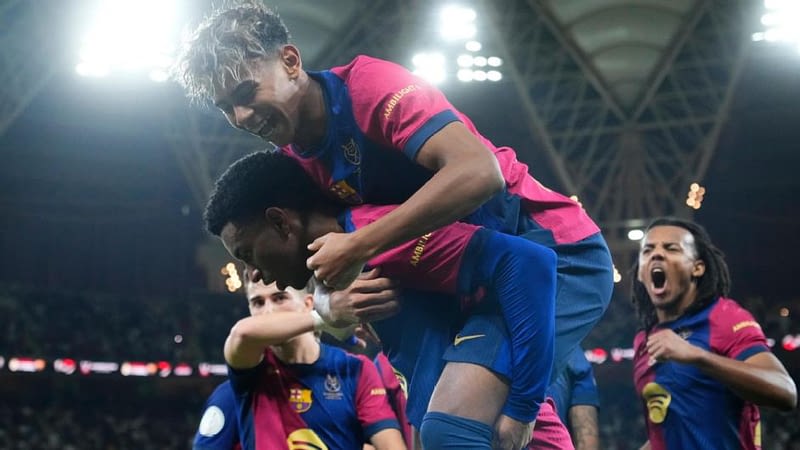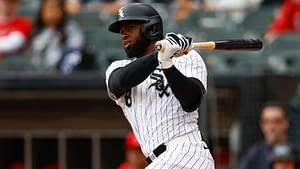Barcelona’s Supercopa Triumph: A Night of Drama and Football Magic in Jeddah
JEDDAH, Saudi Arabia — Picture this: the historic center of Jeddah, where the old heart of the city beats with the rhythm of football. Here lies a humble pitch, an uneven astroturf surface with two undersized goals. Floodlights illuminate the field, and white lines are painted on the ground, but there are no seats for spectators. It’s surrounded by crumbling walls, half-abandoned buildings, and a few palm trees. This is football, raw and unfiltered, as it has always been, everywhere.
Yet, the game has evolved. The 2034 FIFA World Cup is on the horizon, and the football landscape in Saudi Arabia is changing. Cristiano Ronaldo and Karim Benzema are now part of the Saudi Pro League, with Benzema playing for Jeddah’s Al Ittihad. Just 20 miles north of this modest pitch, inside the 62,000-capacity Al Jawhara Stadium in King Abdullah Sports City, the 2025 Spanish Supercopa is taking place.
This tournament has found a home in Saudi Arabia since 2020, with a brief hiatus due to the pandemic, alternating between Jeddah and Riyadh. The latest edition features a “final four” format, bringing together last season’s top two LaLiga finishers and Copa del Rey finalists. A lucrative contract, signed until 2029, is worth around €40 million annually to the Spanish football federation (RFEF), with half of that sum going to the clubs.
Everyone here, except the fans of the other two teams involved, is hoping for a Real Madrid–Barcelona final. It’s the revamped tournament’s raison d’être: bringing a competitive Clásico, with a trophy at stake, to Saudi Arabia, generating attention and profit.
“Are you going to the game?” an excited luggage handler at Jeddah’s King Abdulaziz International Airport asked. “I hope it will be Real Madrid vs. Barcelona. It would be a beautiful final.”
And indeed, it was. The third consecutive Clásico Supercopa final, following Barça’s 3-1 win in 2023 and Madrid’s 4-1 victory in 2024. Sunday’s 5-2 win for Barcelona had everything. Seven goals, a penalty, and a red card. These games are inherently unpredictable, as Madrid coach Carlo Ancelotti had explained a day earlier.
“Quality prevails,” Ancelotti said. “There’s so much individual quality that it overcomes the collective, which is above all in defense.”
As it turned out, Ancelotti’s words were prophetic. Individual quality shone brightly. For Barcelona, it was Lamine Yamal, Raphinha, and Robert Lewandowski. For Madrid, it was Kylian Mbappé, Jude Bellingham, and Vinícius Júnior.
Defending? Not so much.
The defensive lapses from both teams only added to the drama. Barcelona had two chances to score in the first five minutes alone, with Thibaut Courtois saving Yamal’s curling shot and then Raphinha’s header. But less than a minute later, Madrid went ahead on the counter-attack, with Mbappé sprinting from the halfway line, twisting Alejandro Balde in knots before shooting across goalkeeper Wojciech Szczesny.
Mbappé’s first Clásico in LaLiga in October was a misfire: Madrid lost 4-0, and Mbappé experienced a mini-crisis of faith, caught a record eight times by Barcelona’s ruthlessly tight offside trap. Here, his confidence was high. Madrid has played three finals this season: the UEFA Super Cup, the FIFA Intercontinental Cup, and the Spanish Supercopa. Mbappé has scored in all of them. Soon he was brushing off challenges, Ronaldo Nazario style, before being brought down, hurting his ankle.
But Barcelona’s dominance of possession was already striking, with 83% of the ball in the first 20 minutes. And it wasn’t long before they were level, a quick passing move ending with Lewandowski playing in Yamal, who did what he does — cutting inside, Lionel Messi-like, and finishing left-footed past Courtois. The goals kept coming. In the 35th minute, a penalty to Barça, awarded after a VAR check found Eduardo Camavinga had caught Gavi with his studs. Lewandowski scored to make it 2-1.
This was already exactly the spectacle the federation and the Saudis wanted, the two biggest clubs in the world going toe-to-toe. But then Barcelona found another gear, and Real Madrid collapsed.
“They scored the goals easily,” Ancelotti said afterward. “We lost a lot of duels … I don’t have to name anyone, I’m talking about the whole team, we didn’t defend well.”
There were two more Barcelona goals before half-time, Raphinha powering a header past Courtois, and Balde scoring in the last of nine added minutes. It was 4-1, and on the Barcelona bench, the substitutes and staff were leaping into the air in joyous celebration. Ancelotti made changes, bringing on Dani Ceballos for Camavinga — who had been yellow-carded — and Rodrygo gave Madrid hope, hitting the crossbar from an offside position. But a minute later, Raphinha had scored again. 5-1.
The Real Madrid fans inside the stadium sat in stunned silence. Barcelona’s could barely believe what was happening, either. The game was over as a contest, but still, the action kept coming. Mbappé went past Szczesny and was brought down on the edge of the box, the keeper sent off, Barça down to 10 men. Rodrygo converted the free kick. There was even time for Dani Olmo — whose availability for the tournament was in doubt until Spain’s sports ministry (the CSD) ruled that he should be temporarily re-registered as a Barça player — to play the last half hour. By the final whistle, many of the Madrid fans had already left their seats and headed for the exits.
Barcelona’s 5-2 win is emblematic of a season defined so far by its uncertainty. Barça looked unstoppable early on, leading the way in LaLiga; then their form fell apart, as Madrid slowly found themselves, and Bellingham started scoring. But Barça hasn’t always played badly in defeat, and Madrid often hasn’t convinced in victory. And right now, neither team is on top of LaLiga anyway, at the season’s midpoint: that’s Atletico Madrid, who quietly beat Osasuna 1-0 in the league on Sunday.
What happens in the second half of the season is anyone’s guess, but this was a triumphant night of rebirth for Barcelona, coach Hansi Flick and his players, and a major blow for Madrid, who don’t lose many finals, certainly not conceding five goals.
And it was a very good night for the Spanish football federation. Selling a product like this is easy.
“For us [Saudis], football belongs to two countries: Brazil, and Spain,” Fahad, a driver and security guard, told me before the game. It’s illustrious company. After winning Euro 2024, Spain is back, the image of the national team restored. After this Supercopa, so are Barcelona.
Originally Written by: Alex Kirkland





















